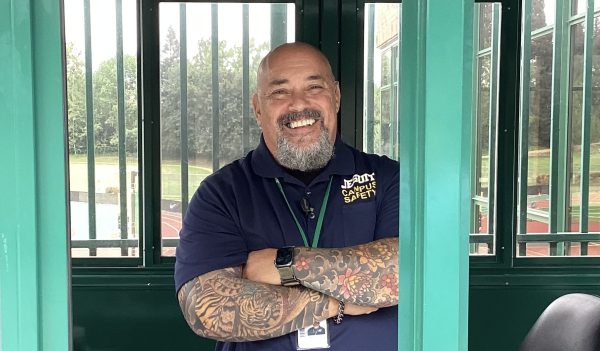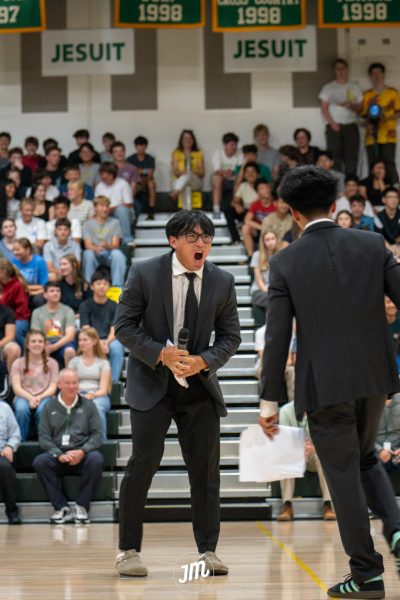Friendships as a Teen: Can They be Enriching and Life-Long?
Mia Henninger with her friends at a football game.
The teen years are an exciting period filled with opportunities, maturing, finding identity and solidifying friendships. But teenagers also experience immense change, especially in friendships.
Is it possible to create long-lasting and life-giving friendships in high school as a teen today?
Some factors specific to high school make forming meaningful friendships and connections with others difficult.
For one, high school is a complete shift with social dynamics.
“Friend groups get formed early on and it’s not really [socially] acceptable to venture out of that friend group,” senior Mia Henninger said. “If you do, someone is mad at you all the time or you don’t feel as accepted in that friend group.”
Unfortunately, the people in someone’s freshman year friend group are not always the people who someone can create a long-lasting friendship with. It takes time to find those people and it can be scary to leave behind something already established.
“At the start [of high school] you don’t necessarily find a group that you feel like you fit into, so you have to jump around and that can be difficult,” senior Morgan Beilstein said.
Beilstein mentioned that high school is a time where many feel out of place, a feeling magnified if there aren’t people to go through the changes with.
In addition to feeling disconnected from peers, there are also more solemn reasons why teens find creating deep friendships difficult.
“I think it’s hard to want to form long-lasting friendships because you know that you’re going to leave after senior year and split up,” senior Drew Pedersen said.
After high school, friends often separate by going to different colleges, finding employment, or taking a year off to do something they love.
A study found most people met their best friend in college anyway, and therefore high school students may wonder if it’s even worth putting in so much effort, especially with the major difficulty teens had to endure in 2020.
As with many aspects of life for teens, the Covid pandemic greatly affected high school friendships.
From a poll taken of parents in 2021 after Covid-19, 75 percent said that they have noticed a “negative impact on their teens being able to interact with their friends” (Mott Poll).
“We [seniors] are now meeting a lot of people that we could have been much better friends with earlier in high school,” Henninger said.
For some seniors, in a perhaps unexpected way, Covid solidified the senior friend groups created in freshman year. Many people, because school was online and did not lead to new friendships forming, stayed with the group of people they had met freshman year.
“Our class is more cliquey senior year than we were freshman year. Friend groups are more formed after Covid,” Pedersen said.
There are also difficulties with maintaining these friendships after they’ve been formed.
“It can be difficult to not compare to see how much they are hanging out with other people while you’re busy,” sophomore Emma Bennett said.
The schedule of the school day, along with the busyness of life outside of school complicates teen friendships.
“Sometimes you only have classes with certain people and only see certain people throughout the day. You really need to make time outside of school for your friendships,” sophomore Amelia Anderson said.
The world now is also different for many teens because of the role technology plays.
Not only has it become easier to stay behind the screen and make friends without ever having to talk face-to-face with them, but it is also much simpler to stay connected with people when you are not around them.
“I’m in a groupchat with my two really good friends that don’t go to school with me,” sophomore Asaph Tekeste said. “Sometimes there are a lot of messages to go through, but it’s a way to put effort into the friendship.”
There are also remedies for the rough patches of friendships caused by the difficulties that teens face.
“You have to be able to talk out the issues,” Anderson said. “Making sure to not sit with them without communication.”
What are people looking for in a long-term friend?
“I think a long-lasting friend is someone you can do anything with and someone who is consistent with checking up on you, not just when you’re obviously not ok,” Henninger said.
Some look for someone who is a combination of characteristics.
“I look for someone who can take a joke, but will, in the end, always be a shoulder to cry on,” Beilstein said.
At its base, friendship is about the desire to put in the effort for a lasting friendship.
“I think friendship is all about finding someone who you want to spend time with and who cares enough about you that they want to also be with you,” Tekeste said.
Do teens believe it’s possible to come out of high school with long-lasting and life-giving friendships?
“You can make long-lasting friendships in high school,” Bennett said. “You just need communication, making sure the relationship isn’t one-sided, and, ultimately, someone who makes you happy.”
Sometimes that means stepping out of your comfort zone.
“You just have to venture out of your friend group and then wait for the right person at the right time,” Henninger said.
Although there are some hindering factors and it sometimes takes courage, it’s important for teens to prioritize friendships in their life nonetheless. And there are still teens who leave their high school experience with friends that will last a lifetime.
“I am lucky to say that I do have long-lasting friendships,” Beilstein said. “Once I found the right people it wasn’t difficult to form those friendships.”
For Beilstein, these friendships were born organically. Henninger found her friendships happening naturally as well.
“I wasn’t searching for that type of friendship. It was a right time, right moment thing,” Henninger said.
Maybe other teens will find as well that it is just a “right time, right moment” experience.









